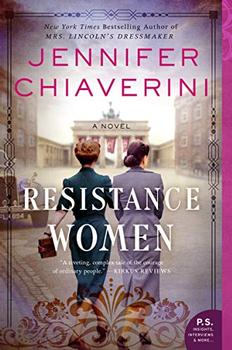Book Club Discussion Questions
Want to participate in our book club? Join BookBrowse and get free books to discuss!
Please be aware that this discussion guide will contain spoilers!
- Had you heard of Mildred Fish Harnack or the Red Orchestra before reading Resistance Women? What role do novels have in our understanding of history? Did Resistance Women change your perception of World War II or Nazi Germany?
- From Mildred's and Greta's humble beginnings to Sara's and Martha's more privileged upbringings, Resistance Women tells the story of women from very different backgrounds. Discuss how their unique personalities contributed to the resistance fight. Which woman's story resonated with you the most?
- In response to Mildred saying that she is no longer surprised by the fighting between the Communist Reds and the Nazi Browns, Arvid responds, "Darling, you must never become accustomed to the extraordinary and outrageous. If you do, little by little, you'll learn to accept anything." Do you agree? In what ways does Mildred take his advice to heart? What examples of this accepting of the outrageous have you seen in your own life?
- Kinder, Küche, Kirche (children, kitchen, church)— the traditional vision of women as purely domestic— is mentioned more than once by Mildred and her comrades. The slogan dates from the eighteenth century but reappeared in Hitler's Germany. Why do you think the Nazis chose to glorify homemaking and childrearing in their vision of the Reich? How did that idealized vision of housewives contrast with what women were actually doing in Germany during the war years?
- When forced to decide whether to help translate Hitler's manifesto into English, Greta ultimately decides to work on the translation. Was that the right decision? What was her motivation for doing the work?
- Despite having a young child, Greta and Adam still chose to take part in the Red Orchestra. Would you have done the same?
- What did you make of Sarah's relationship with Dieter? What do you think her life would have been like had she chosen to stay with him and get married?
- Mildred goes home to the US at one point, but chooses to return to Germany, to Arvid and the work of resistance. Was that a foolish decision? A brave one? What would you have done?
- "Perhaps Germany will serve as a warning," Arvid says. "May they learn from us to snuff out fascism in America when the first sparks arise and not delay until democracy goes up in flames all around them." Has America learned that lesson? What factors might cause fascism to rise in America as it did in Nazi Germany? How would Americans combat it?
Unless otherwise stated, this discussion guide is reprinted with the permission of William Morrow. Any page references refer to a USA edition of the book, usually the trade paperback version, and may vary in other editions.
